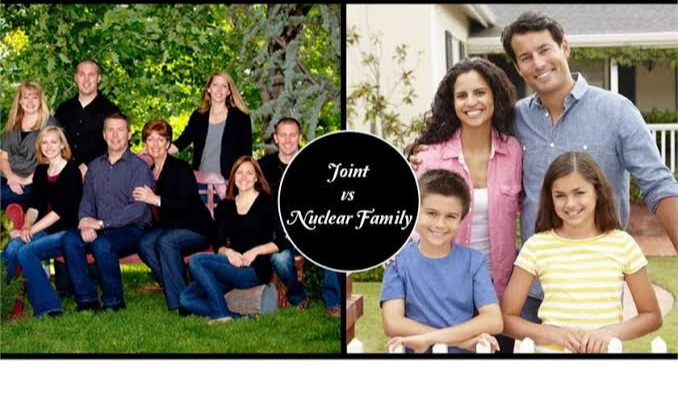Over the last few decades there has been a drastic change in the social fabric of our country. There has been a gradual disintegration to the joint family system and emergence of nuclear family. In simple words, a nuclear family is one which consists of the husband, wife and their unmarried children. Soon after marriage, the children leave their parental home and establish their separate household. Hence a nuclear family is an autonomous unit free from the control of the elders. Since there is physical distance between parents and their married children, there is minimum interdependence between them. Thus a nuclear family is mostly independent. This disintegration, thus, gives an opportunity to build more financial stability, making children less dependent and inclining them towards personal and academic development.
In the past, most families lived in a collective family structure. The duties were shared because there were many family members living together. Common life, shared duties and services, as well as co-existence, played a key role in creation. There used to be a ‘Karta’ who was the family ‘s head and was in charge of taking care of the family. All the working members of the family contributed to the popular pool, but the families began to disintegrate with changing times and become more nuclear in nature. The reason for more and more families adopting the nuclear family system is the various advantages experienced by the people. With the changing attitude and independent way of living of people, there is no chance of in-laws conflict in this system.
Because of less members in the family money can be saved for future and there is no pressure of being engaged in a particular economic activity. The nuclear family also plays an important role in development of personality of individuals and the condition of women is comparatively better than in joint families. She gets ample amount of time for her husband and children and can give time to her own hobbies. Even after these advantages the continuing joint family system cannot be mocked at all. There has been growing cases of conflict between own brothers, sisters and other family members because of the fact that they don’t live together and therefore have lost the love and respect for each other which would have existed otherwise. Generally, people living in nuclear families start considering their own extended family as mere guests and the future generation in their homes also inculcates the same beliefs. In many families today, both husband and wife are working and are left with too less time to look after their children and this system of living being an autonomous unit, is free from the control of elders so children may develop all sorts of bad qualities. If the wife is not working then she suffers from loneliness which would never be in the joint families.
Weighing these advantages I personally believe that the concept of nuclear families has not only destroyed the social fabric but has also posed many challenges to the government. There has been a considerable increase in demand for separate houses and the increasing internal conflicts for property etc have laid a plethora of cases in front of the judiciary. The concept of old age homes has also gained pace because the children no longer believe that elders are their responsibilities. The fast-paced life and want to live without interference renders children to not live with their own parents. People generally keep caretakers in their old days and there have been numerous cases where the caretakers misbehave and even kill the old people for stealing their property. Indeed, there are merits in both the systems and families live in both ways even today. There is only a need to be considerate about everybody and to not forget the parents and extended family.
Komal@Samacharline

